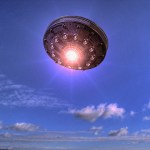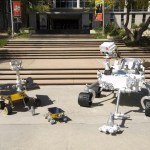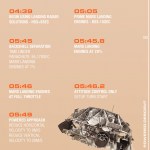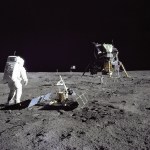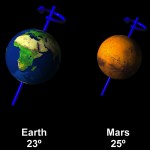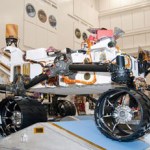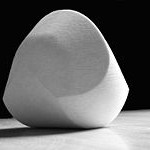Curiosity
"Mars once was wet and fertile. It's now bone dry. Something bad happened on Mars. I want to know what happened on Mars so that we may prevent it from happening here on Earth." -Neil deGrasse Tyson
Oh, it's true alright, something bad did once happen on Mars. And although there isn't any real danger of that happening to Earth, a little conversation I had earlier this week made me think that it's time to tell all of you a story about our red neighbor, and why it is the way it is today.
You see, when we think about Mars, we think about the smallish, red, desolate world that fascinates us today…
I'm kidding, I'm kidding, NASA did not say that. But I do think people need to take it down a notch with this whole blaming NASA for doing their press conferences wrong. As far as I know, the Curiosity Martian Laboratory Robot recently approached a non nondescript pile of dirt, analyzed the bejesus out of it as a test of the fancy dancy instruments on board, and everything worked. The pile of dirt was not interesting but they did to that pile of dirt what would have required 3,000 feet of laboratory floor space full of expensive equipment and a dozen technicians working for two months back…
I remember old sci-fi stories, where the colony ship would take generations to turn up in a new system, they'd take a brief look from orbit, land, and get overwhelmed by monsters / bacteria / natives / whatever exciting thing the author had thought up. And the obvious question was always: well, why didn't they spend a bit longer checking everything was all right? And the answer of course was that would make the story too boring.
But the contrast with Curiosity is fun. BA reports that because they've seen one odd little thing, everything is on hold until they've figured it out.
"I am looking at the future with concern, but with good hope." -Albert Schweitzer
As you all know, the most ambitious interplanetary mission ever attempted -- Mars Science Laboratory -- successfully landed its Curiosity rover on Mars earlier this week. Last night, I had the opportunity to go on my local news and speak a bit about it, and as always, it was an absolute pleasure.
(Video credit: KGW / Ben Lacy / Carey Higgins / Steph Stricklen.)
Of course we got to talk about the rover itself and its science potential, and exactly how much more sophisticated it is than any of its martian…
“We are much closer today to being able to send humans to Mars than we were to being able to send men to the moon in 1961, and we were there eight years later. Given the will, we could have humans on Mars within a decade.” -Robert Zubrin
This is what we can accomplish when we invest in something big.
Image credit: NASA / JPL-Caltech / Mars Science Laboratory.
I'm not talking about the Olympics, of course. I'm talking about investing in science, in exploration, in robotics, in engineering, in technology, and in humanity, and what can we accomplish?
Image credit: Mars Curiosity / NASA / JPL…
The NASA Mars rover Curiosity just landed on Mars. Those of us who tuned in vicariously via NASA's live coverage watched as a roomful of tense engineers exploded, and heard their disembodied voices whispering and booming through the control room. Holy shit. We did it. Their headsets fell askew, they glad-handed one another, criss-crossing the room, and then, immobilized by a sudden hush as the news spread: We've got thumbnails.
Thumbnails. We watched as a tiny image formed, transmuted across the void of space and into this room. It was black and white, an indistinguishable gesture of light…
The Mars Science Laboratory Mission has piles of cool equipment on board Curiosity Rover, which is closing in on Mars as we speak. The landing is expected to be next Sunday/Monday, 10:31 p.m. Aug. 5 PDT (1:31 a.m. Aug. 6 EDT, 05:31 Aug. 6 Universal Time) plus or minus a minute.. But not really, because the event is happening a it far away in spacetime; those are the times that the signals from Mars will arrive on the planet Earth, about 13.8 minutes after the event has happened. The mission is expected to last one Martian year, which is close to two Earth years. The weather at the landing…
"The achievements of Apollo were so bold and our subsequent efforts so timid that the energy of those years seems like a youthful dream." -Buzz Aldrin
43 years ago today, humanity took our first steps on another world, venturing nearly 400,000 kilometers from home and walking on the surface of the Moon.
Image credit: NASA, Apollo 11, photo by Neil Armstrong.
Of course, what we found there was a world whose soil was very similar to our own, but devoid of any atmosphere, liquid, or signs of life, present or past. But out beyond the Moon, visible in the distance even when viewed from Earth,…
"You better lose yourself in the music, the moment
You own it, you better never let it go
You only get one shot, do not miss your chance to blow
This opportunity comes once in a lifetime yo" -Eminem
Here on Earth, a cold, frozen winter lasts three months, with the Sun's rays pointed a maximum of 23.5 extra degrees away from your part of the Earth from normal.
On Mars, however, winters are even more severe.
Image credit: Calvin J. Hamilton.
With a slightly more severe axial tilt than Earth, an extra 78 million kilometers separating it from the Sun than our planet, and the coldest…
By Dr. Rosalba Bonaccorsi
Environmental Scientist at the Carl Sagan Center for the Study of Life in the Universe, SETI Institute, and Gail Jacobs
Rosalba, what first sparked your interest in science?
I've always had big dreams -- even as a young girl. As soon as I started to walk, I took an interest in conducting experiments with whatever was available around such as household plants and various chemical compounds. I'm lucky I didn't end up poisoned or otherwise hurt! I remember dismantling alarm clocks. I was so curious!
As a young girl, I was in poor health and as a result spent a lot of…
by Nathalie A. Cabrol
I realize how immodest the title of this first blog may sound and it is certainly not my intention to convince anybody that I will answer this question in the limited space allowed here or even in a lifetime. My hope is, instead, to stir thoughts and invite an exchange of diverse perspectives to make this a thread that we can all pull from time to time. It is an immense subject debated in an abundant literature, but discussing it is certainly not the exclusive privilege of those called explorers. All beings, from the greatest minds to the simplest forms of life on this…
by Nathalie A. Cabrol
I realize how immodest the title of this first blog may sound and it is certainly not my intention to convince anybody that I will answer this question in the limited space allowed here or even in a lifetime. My hope is, instead, to stir thoughts and invite an exchange of diverse perspectives to make this a thread that we can all pull from time to time. It is an immense subject debated in an abundant literature, but discussing it is certainly not the exclusive privilege of those called explorers. All beings, from the greatest minds to the simplest forms of life on this…
I'm not really one for collecting things. The fact that I move around a lot twinned with the pathetic size of British homes, doesn't square well with building up much of anything. I finally dumped all my CDs last summer; I give away my books when I'm done with them. Plus, I always felt that collecting things was for people with more money than they knew what to do with.
Nevertheless, my current bedroom is as anonymous as a hotel room, and so I thought I should do what every self-repecting gentleman scholar did in times gone by: build myself a cabinet of curiosities. As the name suggests…

